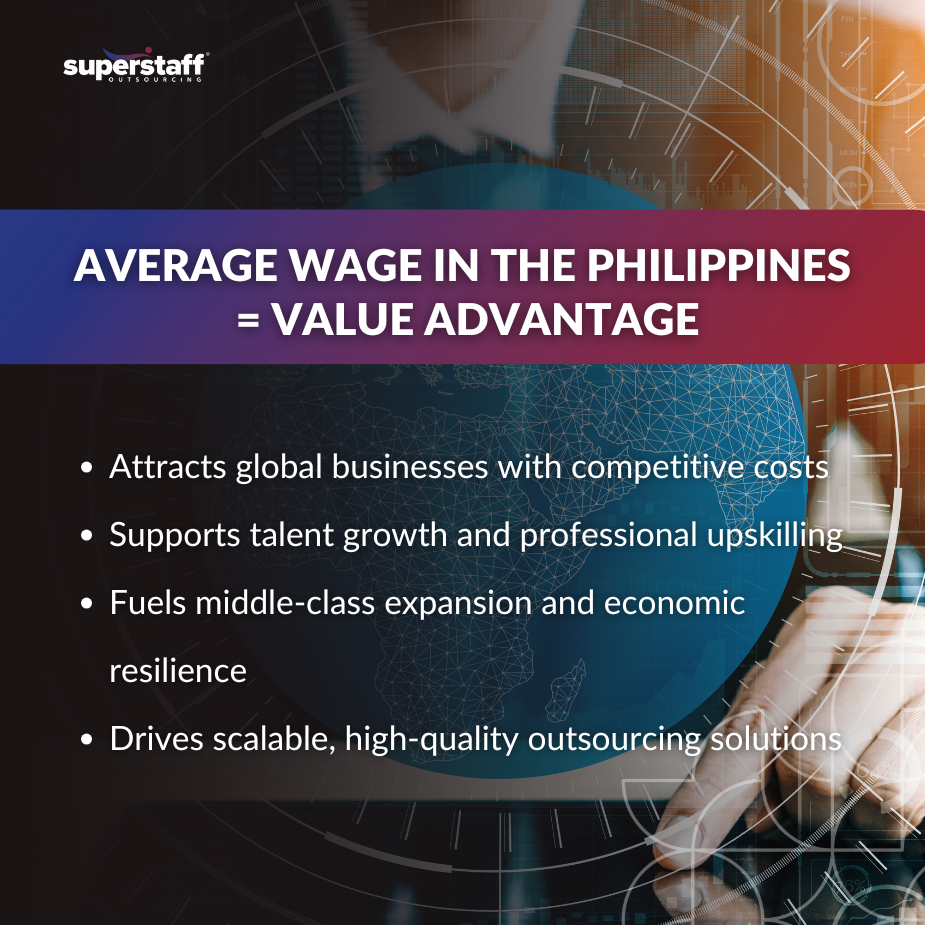
For years, the average wage in the Philippines has been one of the most discussed factors driving the outsourcing industry. Companies around the world, especially in the United States, have looked at the Philippines as a place where they can lower costs without sacrificing service delivery.
Yet, what once started as a story about wage differences has evolved into something far more strategic. Today, the conversation is no longer just about saving money. It is about how those wages reflect a wider value proposition that makes the Philippines an indispensable partner for global businesses.
The Wage Advantage That Started It All
Outsourcing gained traction in the Philippines during the early 2000s when multinational corporations began comparing salaries across regions. At the time, the difference was striking. Businesses that faced rising payroll costs in their home markets realized they could achieve the same, or even better, quality of work at a fraction of the cost by setting up operations in Manila, Cebu, or Davao.
The first wave of business process outsourcing was largely defined by labor arbitrage. The model was simple: save on expenses by transferring roles to where wages were lower. This approach quickly transformed the Philippines into one of the world’s leading outsourcing destinations. Companies understood that while the cost of labor in the Philippines was lower than in the United States or Europe, the talent pool was eager, capable, and ready to learn.
This historical reliance on wages built the foundation for the industry. But wages alone are no longer the defining feature. The industry has matured, and businesses now expect more than simple savings. The average wage in the Philippines may still be competitive compared to the West, but it is just the starting point of a broader discussion about value.
Average Salaries as a Window to Something Bigger
When examining the average wage in the Philippines, it is important to see it as more than a number. Wages provide insight into how the workforce is positioned in the global market. In the Philippines, salaries in the outsourcing sector reflect a workforce that is not only sustainable but also continuously investing in its own growth.
For example, the average salary in the Philippines for BPO workers has enabled professionals to access training opportunities, higher education, and skills development programs. These investments translate into better services for clients abroad. The same employees who started with entry-level positions in customer support are now moving into specialized fields like finance, healthcare, IT, and data analytics.
At the same time, the rising salaries in the outsourcing sector have helped strengthen the country’s middle class. Families that once struggled are now able to invest in homes, education, and healthcare. This stability feeds back into the industry itself, as workers who are financially secure tend to remain loyal to their employers and motivated to deliver excellence.
This context proves that while wage competitiveness brought the world to the Philippines, value creation is what keeps businesses here. The average wage in the Philippines reveals how this balance between affordability and skill development has created one of the most resilient outsourcing industries globally.
The Value Advantage: Quality and Scalability

The average wage in the Philippines should not be viewed in isolation. What truly matters is how this wage supports the creation of scalable and high-quality services for businesses worldwide. For decision-makers, the conversation has shifted from cost per employee to outcomes delivered.
Companies that outsource to the Philippines are not just hiring cost-effective talent. They are gaining access to highly skilled professionals across a variety of industries. Whether it is IT support, healthcare administration, finance, or customer experience, Filipino professionals have proven themselves capable of adapting to global standards.
Scalability is another advantage. Small and midmarket businesses often struggle to match the resources of large corporations. Outsourcing to the Philippines provides them with the ability to expand quickly when demand spikes without taking on the heavy burden of infrastructure costs. In today’s fast-paced market, this flexibility is as valuable as any cost savings.
Technology further amplifies this value. Filipino outsourcing firms have embraced digital transformation, integrating automation, cloud systems, and advanced analytics into their workflows. This means clients benefit not only from affordable wages but also from cutting-edge solutions that enhance service delivery.
Investing in Human Capital
At the heart of the average wage in the Philippines is a deeper story about people. Fair wages directly impact job satisfaction, which in turn influences productivity. Filipino workers are known for their loyalty, dedication, and willingness to go the extra mile when they feel valued.
Cultural alignment also plays a critical role. With English as one of the country’s official languages and strong exposure to Western culture, Filipino employees often share similar communication styles and values with clients from the United States. This reduces friction in collaboration and strengthens long-term partnerships.
There is also something unique about the Filipino work ethic, often summarized in the respectful “Yes po” culture. This reflects a mindset of politeness, adaptability, and service orientation that many clients find refreshing. For global companies, this translates into teams that are not only technically skilled but also genuinely committed to delivering excellent customer experiences.
In other words, outsourcing to the Philippines is not simply about saving money. It is about building trust with a workforce that sees your success as their own.
From Wages to Economic Growth
The average wage in the Philippines is not only significant for businesses but also for the nation itself. The outsourcing industry has become one of the pillars of the Philippine economy, contributing heavily to employment, GDP, and infrastructure development.
The income earned by BPO professionals has fueled demand in sectors like real estate, retail, and lifestyle. Cities such as Makati, Ortigas, and Cebu have transformed into bustling business hubs, complete with modern facilities and thriving communities. The industry has also created ripple effects by supporting small businesses that provide services to employees, from food outlets to transport solutions.
This economic progress enhances the resilience of the Philippines. By creating stable jobs, outsourcing has allowed the country to weather global crises while maintaining steady growth. For international companies, this means they are partnering with a nation whose economy is deeply intertwined with the success of the outsourcing industry itself.
When a business decides to outsource to the Philippines, it is indirectly contributing to this positive cycle. This partnership strengthens both the company’s bottom line and the local economy, creating a win-win relationship.
Value Advantage as the Future
The average wage in the Philippines continues to make headlines, but its role has changed. What once represented a simple comparison with Western salaries now stands as a foundation for something far more valuable: sustainability and resilience.
For businesses navigating global uncertainties, outsourcing to the Philippines provides continuity. The ability to rely on skilled teams who can scale operations up or down without compromising quality is a powerful strategic advantage. Companies are moving away from transactional outsourcing arrangements and instead forming long-term partnerships built on trust and shared growth.
By recognizing the value advantage, decision-makers can ensure their organizations remain competitive. Instead of focusing solely on what they save, they begin to see what they gain: expertise, adaptability, cultural alignment, and innovation. These are the true differentiators in today’s market. The average wage in the Philippines underpins this reality, creating a workforce that is affordable, skilled, and future-ready.
The Average Wage in the Philippines and the Value Advantage
The average wage in the Philippines highlights more than a cost gap with other countries. It signals a broader value advantage that has redefined what outsourcing means in the modern business landscape. Companies no longer come to the Philippines just for wage savings. They come for quality, scalability, human capital, and the opportunity to partner with a nation whose people are invested in their success.
From contributing to national growth to ensuring business resilience, the outsourcing story in the Philippines is one of evolution. It is about moving beyond the first chapter of wage advantage into a future defined by sustainable value.
If your business is ready to experience this value firsthand, SuperStaff can help. With more than 400 dedicated agents and years of expertise in delivering customer experience and back-office solutions, we go beyond cost savings to provide long-term growth opportunities. Partner with SuperStaff today and discover how outsourcing to the Philippines can be your company’s next strategic advantage.






